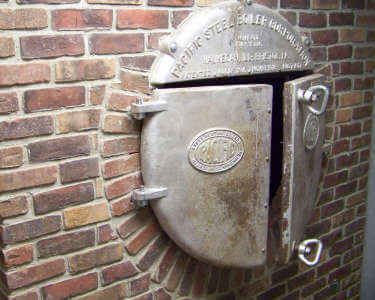
Built by Cornerstone Church in Fresno, the Holocaust Experience will guide visitors through scenes of 12 major events that took place between 1933 and 1945. The scenes span from the rise of Adolf Hitler to Kristallnacht, or “the Night of Broken Glass,” when nearly 1,000 synagogues were set on fire across Germany, to Hitler’s decision to execute genocide as “the final solution to the Jewish question.”
The exhibit, which will be on display until Sunday, is housed in the church’s 15,000-square-foot educational facility and cost nearly $10,000 to build.
(Click here to see a photo gallery from the Holocaust Experience.)
“What we want people to come away with is, hopefully, to experience something emotionally after seeing these depictions,” said Jim Franklin, pastor of 3,000-member Cornerstone Church.
“People need to be aware of what happened so we will not repeat it,” he said.
Franklin, a longtime supporter of Israel and Fresno director of Christians United for Israel, said he was inspired to build the memorial after hearing Iran President Mahmoud Ahmadinejad call for Israel to be “wiped off the map.”
“I said, ‘I’ve heard these types of rantings before,'” Franklin told Charisma. “They were reminiscent of Adolf Hitler and his desire to extinguish the Jews.”
After talking with his teenage son, Franklin said he realized that younger generations may not be fully aware of what took place during the Holocaust. “If we’re not aware of [the atrocities], then we, especially with what we’re hearing in the world climate today, we could possibly repeat those,” Franklin said.
Using nearly 100 actors from the church, which is housed in a historic Fresno theater, the Holocaust Experience begins at an induction center, complete with Nazi soldiers stationed at guard towers.
Visitors then view a documentary showing how Hitler rose to power and move through a series of scenes, including a depiction of the Warsaw Ghetto that features actual video footage and a reconstructed prison train car featuring the recorded account of a Jewish rabbi who at age 8 rode one of the trains to Auschwitz.
The exhibit also includes scenes depicting the gas chambers and ovens where mass murders and cremations took place, as well as a timeline of the Holocaust that adorns a long hallway. The exhibit ends in an auditorium displaying a memorial and a video with survivors’ testimonies.
“They have done an absolutely extraordinary job,” said Rabbi Robert Ourach of Temple Beth Israel in Fresno, who toured the exhibit with another rabbi earlier this week. “It’s not just a series of pictures. There are people, there is audio, there is all kinds of extraordinary information they’ve made available. I think it’s going to be an extraordinarily important thing for the community as well as for those of us in the Jewish community who have the opportunity to see this.”
Ourach said for a church to create a presentation remembering the Holocaust is “an extraordinary thing for the Fresno community.” He noted that as Holocaust survivors die, it becomes easier for some to say the atrocities never took place.
“While the focus really of this exhibit is mostly on what happened on the Jewish community, certainly if we do not stand up against genocide in this day and age in a meaningful way and remember to tell the story of what happened to these people, it would be as if they had died in vain,” Ourach said.
Before building the memorial, which took two years to plan and two months to build, Franklin visited the Holocaust Memorial in Washington, D.C., consulted with Jewish leaders and was assisted by the Museum of Tolerance in Los Angeles.
He said the church, which frequently puts on theatrical productions, was fully supportive of the undertaking. “We have torn up an entire wing of our church, built walls in it, brought dirt,” Franklin said. “I know a lot of churches where there would have already been three deacons meetings and four congregational meetings and the pastor would be gone. Our church has embraced this with a passion and has really recognized that buildings are for people not people for buildings.”
The Holocaust Experience is part of a weeklong commemoration that concludes with A Night to Honor Israel event on Sunday. Tonight the church will premier Janka, a play that writer Oscar Speace adapted from a journal his mother kept while imprisoned in a concentration camp.
Franklin said the memorial will be part of an annual event in support of Israel. He hopes to one day find a building to house the exhibit permanently.














































